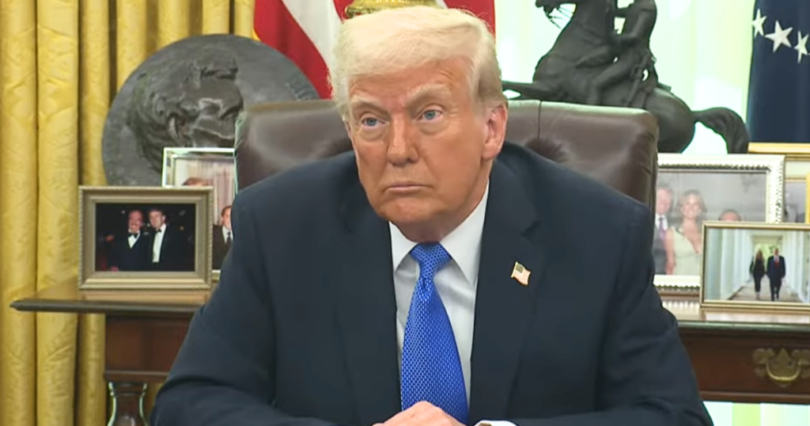Trump Reveals Staffer Included Journalist in Leaked Military Plans Chat, Stands by Walz
In a revealing phone interview, President Donald Trump defended National Security Advisor Michael Waltz after a staffer added Jeffrey Goldberg, the editor-in-chief of The Atlantic, to a sensitive Signal group chat involving senior U.S. officials.
The chat, which was reportedly focused on plans for a military strike against the Houthi rebels in Yemen, has ignited outrage from Democrats and prompted calls for Waltz and others to testify before Congress.
BREAKING: President Donald Trump stands by his national security adviser, Mike Waltz, after The Atlantic’s editor-in-chief was accidentally added to a private, high-level chat on the messaging app Signal.
"Michael Waltz has learned a lesson, and he’s a good man," Trump said. pic.twitter.com/emp5EzMI01
— Resist the Mainstream (@ResisttheMS) March 25, 2025
Trump clarified that Goldberg’s inclusion in the chat was a mistake, explaining that it was “one of Michael’s people” who had mistakenly added the journalist’s number. Despite the controversy, Trump emphasized that Goldberg’s presence in the group chat had “no impact at all” on the mission.
Goldberg’s report, published on Monday, shed light on the March 11 Signal group chat, which was reportedly titled “Houthi PC Small Group,” as TTOA reported earlier. The conversation included high-profile figures such as Waltz, Secretary of Defense Pete Hegseth, CIA Director John Ratcliffe, White House Chief of Staff Susie Wiles, Secretary of State Marco Rubio and Vice President JD Vance.
The officials discussed plans to target the Iran-backed Houthi rebels in Yemen, with a specific focus on timing the strike.
According to Goldberg’s account, the group discussed when the first detonations would take place, with the explosions in Yemen reportedly occurring around 1:45 p.m. Eastern Time. Goldberg described waiting in his car in a supermarket parking lot and checking for reports of explosions.
He noted that by 1:55 p.m., he confirmed that explosions were heard in Sanaa, the capital of Yemen.
Signal, an encrypted messaging app, allows users to communicate securely, but Goldberg’s inclusion in a highly sensitive chat has raised concerns, Fox News reports. The National Security Council has confirmed that it is investigating how Goldberg’s number ended up in the group chat, but the White House maintains that no classified information was shared.
The inclusion of Goldberg in the chat has led to significant backlash from Democratic lawmakers, with many demanding that Waltz and Hegseth step down from their national security roles. There have also been calls for them to testify before Congress about the incident.
Trump, however, strongly defended Waltz, stating that the national security advisor had “learned a lesson” and would not be fired over the incident. Trump also emphasized that the chat was not as significant as some critics made it out to be, stating that the discussions in the group had “nothing important” and were not related to any classified plans.
(Biden leaves billions of dollars of military equipment behind and terrorists happily scoop it up…)
DEMOCRATS: “Eh, mistakes were made… we just need to learn from this and move on.”
(Trump staff includes a reporter in military plans…)
DEMOCRATS: “HOW COULD HE DO THIS??? OUR…
— Zeek Arkham 🇺🇸 (@ZeekArkham) March 25, 2025
White House Communications Director Steven Cheung dismissed the backlash as part of a pattern of anti-Trump tactics, referencing the Russia investigation and other past controversies. He characterized the uproar over the Signal chat as “nothing more than a section of the NatSec establishment community running the same, tired gameplay from years past.”
JUST IN: Rep Jim Jordan defends Hegseth and Waltz, saying, “The signal chat didn’t contain classified information. Terrorists were killed. Americans are safer.” pic.twitter.com/Mhx5dK2Gva
— Resist the Mainstream (@ResisttheMS) March 25, 2025
White House Press Secretary Karoline Leavitt reiterated the administration’s position, stating that “no ‘war plans’ were discussed” in the chat and that “no classified material was sent to the thread.” She added that the White House Counsel’s Office was investigating the situation.
Despite the controversy, the White House maintains that the strike against the Houthi rebels was a success, with Trump reaffirming that the operation achieved its objective of eliminating terrorists.
Scroll down to leave a comment and share your thoughts.


Leave a Comment